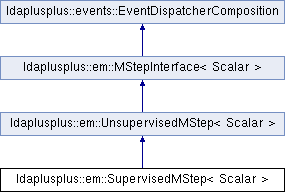|
LDA++
|
|
LDA++
|
#include <SupervisedMStep.hpp>

Public Member Functions | |
| SupervisedMStep (size_t m_step_iterations=10, Scalar m_step_tolerance=1e-2, Scalar regularization_penalty=1e-2) | |
| virtual void | m_step (std::shared_ptr< parameters::Parameters > parameters) override |
| virtual void | doc_m_step (const std::shared_ptr< corpus::Document > doc, const std::shared_ptr< parameters::Parameters > v_parameters, std::shared_ptr< parameters::Parameters > m_parameters) override |
 Public Member Functions inherited from ldaplusplus::events::EventDispatcherComposition Public Member Functions inherited from ldaplusplus::events::EventDispatcherComposition | |
| std::shared_ptr< EventDispatcherInterface > | get_event_dispatcher () |
| void | set_event_dispatcher (std::shared_ptr< EventDispatcherInterface > dispatcher) |
SupervisedMStep implements the M step for the categorical supervised LDA.
As in FastSupervisedMStep we delegate the maximization with respect to \(\beta\) to UnsupervisedMStep and then maximize the the lower bound of the log likelihood with respect to \(\eta\) using gradient descent.
The difference of SupervisedMStep compared to FastSupervisedMStep is that this class uses the second order taylor approximation (instead of the first) to approximate \(\mathbb{E}_q[\log p(y \mid z, \eta)]\).
\[ \mathcal{L}_{\eta} = \sum_{d=1}^D \eta_{y_d}^T \mathbb{E}_q[\bar{z_d}] - \sum_{d=1}^D \log \sum_{\hat{y}=1}^C \exp(\eta_{\hat{y}}^T \mathbb{E}_q[\bar{z_d}]) \left( 1 + \frac{1}{2} \eta_{\hat{y}}^T \mathbb{V}_q[\bar{z_d}] \eta_{\hat{y}} \right) \]
This approximation has been used in [1] but it is slower and requires huge amounts of memory for even moderately large document collections.
[1] Chong, Wang, David Blei, and Fei-Fei Li. "Simultaneous image classification and annotation." Computer Vision and Pattern Recognition, 2009\. CVPR 2009. IEEE Conference on. IEEE, 2009.
|
inline |
| m_step_iterations | The maximum number of gradient descent iterations |
| m_step_tolerance | The minimum relative improvement between consecutive gradient descent iterations |
| regularization_penalty | The L2 penalty for logistic regression |
|
overridevirtual |
Delegate the collection of some sufficient statistics to UnsupervisedMStep and keep in memory \(\mathbb{E}_q[\bar z_d]\) and \(\mathbb{V}_q[\bar z_d]\) for use in m_step().
| doc | A single document |
| v_parameters | The variational parameters used in m-step in order to maximize model parameters |
| m_parameters | Model parameters, used as output in case of online methods |
Reimplemented from ldaplusplus::em::UnsupervisedMStep< Scalar >.
|
overridevirtual |
Maximize the ELBO w.r.t. to \(\beta\) and \(\eta\).
Delegate the maximization regarding \(\beta\) to UnsupervisedMStep and maximize \(\mathcal{L}_{\eta}\) using gradient descent.
| parameters | Model parameters (changed by this method) |
Reimplemented from ldaplusplus::em::UnsupervisedMStep< Scalar >.
 1.8.11
1.8.11